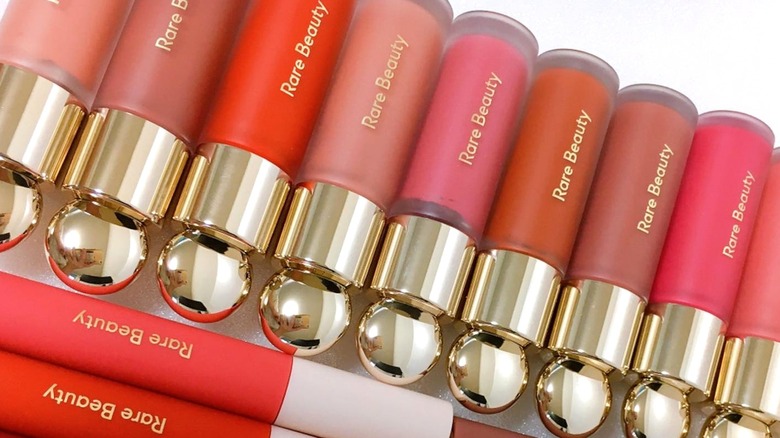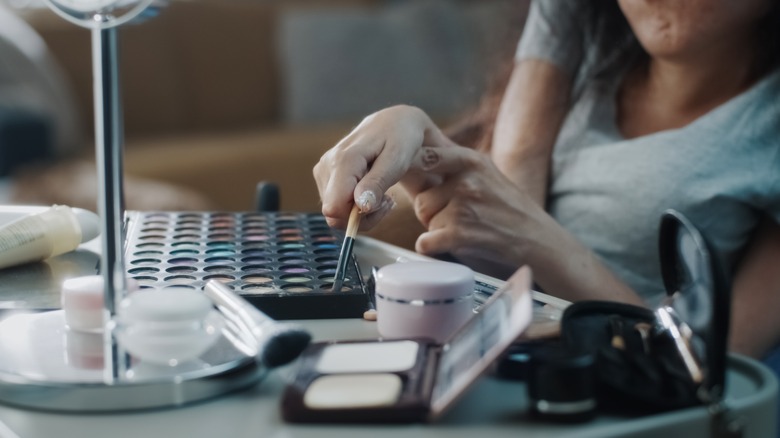Rare Beauty's Accessible Makeup Proves Simple Changes Can Make Beauty More Inclusive
While the beauty industry has made notable efforts to be more inclusive, critics say that ultimately it remains exclusionary towards those with disabilities. From packaging limitations on products to difficult website designs, the lack of acknowledgment for disabilities has left many feeling excluded and underserved.
For Christen Roos, a person with short arms, the impact of her disability is felt widespread throughout her life – even down to mundane undertakings like reaching for top shelves and easily twisting jars. Makeup has especially been a point of frustration for the 37-year-old Canadian, which she discussed in a TikTok video about Rare Beauty's liquid blush and how much the packaging means to her. "I can't tell you how many times I've bought makeup, gotten home, and then couldn't open it," she shared to the camera.
Roos' video comes in response to another user's video stating that the Rare Beauty liquid blush "sucks" and "gets everywhere." While many makeup products have smooth surfaces without much grip and small buttons, this product from Selena Gomez' beauty line has a circular lid that allows for twisting with ease. Roos, born with a rare genetic disorder, is missing a bone in her arms, as well as muscles and tendons. This makes opening many makeup jars a challenge. "...I'm really good at having short arms, but I don't think anyone understands how challenging it is to live in an able-bodied world," Roos shared in an interview with BuzzFeed News. "I'm always surprised when something is easy to open, but it should all be easy to open. So when I bought this Rare Beauty blush, I was amazed."
Beauty still prioritizes able-bodied people
According to the World Health Organization, around 15% of the world's population lives with some form of disability. Representation and inclusivity mean something different to every individual, but when it comes to the beauty industry and those with disabilities, it extends well beyond media visibility. It's also a matter of accessible design and production. Presently, only 4% of beauty and personal care brands create products accessible to people with disabilities, according to Procter & Gamble. Some social media users have taken to TikTok to highlight the personal impact of this reality. In one video, user @crueltyfreegracefully shares how many common snap and twist style lids are impossible to open because they aggravate their arthritis symptoms. They later shared in a different video that they appreciate Rare Beauty's lip tubes for featuring rounded knobs that allow for easier opening.
Although Rare Beauty has not yet confirmed any testing on its packaging, its website states that "ease of use and inclusivity are highly prioritized." Rare Beauty founder Selena Gomez, who was diagnosed with lupus in 2014, has been open about her experiences with autoimmunity and undergoing extensive treatments such as chemotherapy. Rare Beauty's site further states that its products are "designed to Selena's personal preferences to emphasize ease of use."
Mariadeliz Santiago, a 27-year-old beauty influencer with Schinzel syndrome, is another Rare Beauty enthusiast who is hopeful the brand will set a new standard for other companies to follow. Speaking to Buzzfeed News, she said, "Disabled individuals have the right to have fun and engage in leisure activities like makeup that are accessible, just like vehicles and buildings are expected to be accessible."
Everyone benefits from accessibility
Gomez' brand attests to just how easy it can be to implement a universal approach for designing products so that everyone can use them, with or without disabilities. Many on TikTok have praised the packaging's accessible features, from buttons that are easy to press to surfaces with matte finishes. These subtle changes can make all the difference without requiring a company to spend a lot of money to produce a completely separate product.
"Beauty brands must better serve this segment," Sarah Willersdorf, managing director and partner at Boston Consulting Group, shared with Vogue Business. "It is not only the right thing to do from a DEI standpoint, but there is a significant profit pool that companies are simply overlooking today."
Universal design is also valuable because it can help consumers who may have low vision or who may not understand the language of the brand's copy. Moreover, prioritizing web accessibility, such as alt text, can help provide better consumer experiences for people with disabilities as well. What's crucial in order to achieve universal accessibility, though, is for the beauty industry to actually engage with all kinds of communities and consumers, so their needs can be understood and met. "Disability only exists because of the barriers that society puts forward for us, so when we educate, when we share our lived experience and take time to learn how other people's bodies move, then we can be in this together," Roos told BuzzFeed News.

